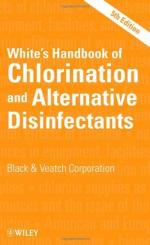|
This section contains 532 words (approx. 2 pages at 300 words per page) |

|
Chlorination refers to a chemical process that is used primarily to disinfect drinking water and spills of microorganisms. The active agent in chlorination is the element chlorine, or a derivative of chlorine (e.g., chlorine dioxide). Chlorination is a swift and economical means of destroying many, but not all, microorganisms that are a health-threat in fluid such as drinking water.
Chlorine is widely popular for this application because of its ability to kill bacteria and other disease-causing organisms at relatively low concentrations and with little risk to humans. The killing effect occurs in seconds. Much of the killing effect in bacteria is due to the binding of chlorine to reactive groups within the membrane(s) of the bacteria. This binding destabilizes the membrane, leading to the explosive death of the bacterium. As well, chlorine inhibits various biochemical reactions in the bacterium. In contrast to the rapid action of...
|
This section contains 532 words (approx. 2 pages at 300 words per page) |

|


